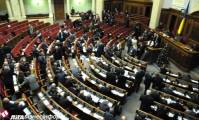Repressive media restrictions dropped in law on sanctions

On Thursday the Verkhovna Rada voted to adopt Law No. 4453a on international sanctions for supporting and financing terrorism in Ukraine. Highly contentious provisions which would have enabled Ukraine’s Security and Defence Council to restrict or close Ukrainian media were withdrawn from the bill.
The bill was initiated by the government and in presenting it on Thursday, the Prime Minister Arseny Yatsenyuk stated that since its first reading on Tuesday, a number of amendments had been made. “This is a framework law, he said, - which gives the state the right to defend its interests. The head of state will have the right, via the National Security and Defence Council [RNBO] to introduce a range of sanctions along the lines of those imposed by our western partners – EU countries, the USA and the G7.”
According to Yatsenyuk, the government had agreed to remove restrictions proposed against postal services, television, radio and other media. Such restrictions can therefore only be imposed by a court order. The sanctions will apply against 172 individuals and 65 legal entities from Russia and other countries for financing terrorism in Ukraine and supporting Russian occupation of the Crimea.
Asked by MPs about whether the sanctions would affect Ukrainian nationals, Yatsenyuk stated that they would only touch an aggressor state, foreign businesses and only foreign agents and the like.
The bill received 244 votes (with the minimum required 226).
The original draft, adopted as a base on Aug 12, aroused a wave of protest from journalist unions and associations, as well as from international media watchdogs. There were fears that national security considerations could result in serious restrictions on media freedom, with the RNBO being given powers not assigned it by Ukraine’s Constitution.
The original draft law No. 4453a would have made it possible, without a court ruling, for RNBO to: ban or restrict the broadcasting of television or radio stations and / or the use of Ukrainian radio frequencies; restrict or suspend media and other information sources, including on the Internet; restrict or ban the production or circulation of printed matter or other information material; restrict or suspend telecommunication services and the use of telecommunication networks.
There was no time limit on such powers, and they allowed the RNBO and President, rather than the court, to decide whether a given media source posed a danger to national security etc.
New information from Radio Svoboda and Liga.net





